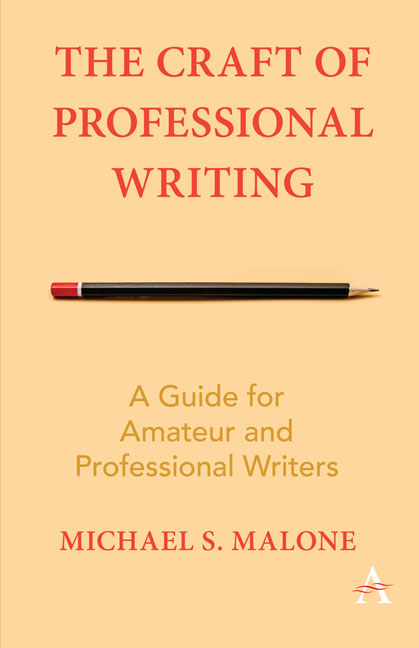Book contents
- Frontmatter
- Dedication
- Contents
- Introduction
- Part One Basics
- Part Two Corporate Careers and Disciplines
- Part Three Writing Careers in Media
- 8 Blogger
- 9 News Reporter
- 10 Critic
- 11 Essayist
- 12 Book Author
- 13 Television and Radio News Reporter
- 14 Screenwriter and Playwright
- 15 Fiction Writer and Novelist
- 16 Academic Track
- 17 Miscellaneous Writing
- Part Four The Work of Professional Writing
- Further Reading
- Suggested Assignments
- Index
16 - Academic Track
from Part Three - Writing Careers in Media
- Frontmatter
- Dedication
- Contents
- Introduction
- Part One Basics
- Part Two Corporate Careers and Disciplines
- Part Three Writing Careers in Media
- 8 Blogger
- 9 News Reporter
- 10 Critic
- 11 Essayist
- 12 Book Author
- 13 Television and Radio News Reporter
- 14 Screenwriter and Playwright
- 15 Fiction Writer and Novelist
- 16 Academic Track
- 17 Miscellaneous Writing
- Part Four The Work of Professional Writing
- Further Reading
- Suggested Assignments
- Index
Summary
Until now we have been largely discussing writing careers in the commercial world. In this chapter, we'll take a break from that thread and look at an alternative writing career— one that may not carry the same potential for fame, but can actually be more financially rewarding, stable and fulfilling than what we think of as “professional writing”: academic writing.
Like many writers, the author (without really knowing it) reached a decision point in his writing career in the months before his undergraduate college graduation. In one direction stretched the commercial world, in the other, graduate school and a life in academia.
I barely gave it a thought: I wanted to be a writer, not a professor. And, so, I went to work in corporate public relations and after four years became a newspaperman. I never looked back until decades later, when I finally did become an adjunct professor. And it was only then, as I looked at the life of a college professor up close— and even more when I finally identified the sophisticated parallel universe of academic publishing— that I began to wonder if I had made a terrible mistake all those years before.
The author will try to present this other world as objectively as possible, though you may notice a bit of bias— a combination of envy and amusement— creeping in.
Definition of the academic track
The academic track is the pathway by which writers establish a career by positioning themselves within academia and build a reputation— and earn awards— by writing for audiences and publishers largely within the academic world. The biggest difference between commercial writing and academic writing is that the former is typically the career itself, while the latter is a valuable sidelight to the primary work of teaching.
The academic pathway
If a commercial writing career can best be described as the zig- zagging pursuit of ever- greater opportunity, an academic writing career is much more of a straight, predetermined path where the only thing in doubt is when (and if) the next promotion will occur. The standard path, pretty much set in stone two centuries ago, goes like this.
- Type
- Chapter
- Information
- The Craft of Professional WritingA Guide for Amateur and Professional Writers, pp. 255 - 266Publisher: Anthem PressPrint publication year: 2018



